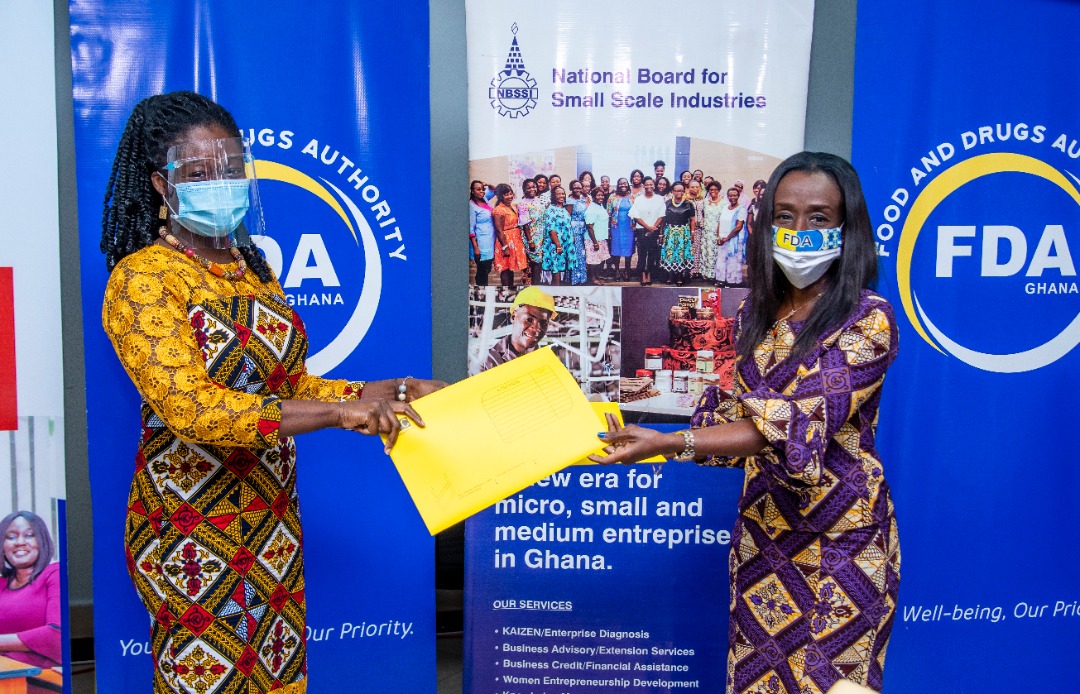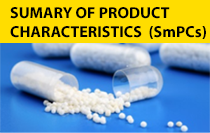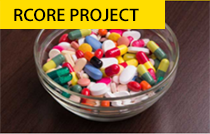
Report Adverse Reaction

Approved fees Schedules

Products Recall And Alert

For Stakeholders

Submit a Complaint

FAQs

Submit Advert Application

Submit Advert Application

Consumer Education
News & Events
Latest News
2024-04-17 00:00:00
Ghana�s COVID-19 Safety Monitoring Effects Receive Global Acclaim2024-04-05 00:00:00
FDA AND AFROCET MONTGOMERY MEETS STAKEHOLDERS2024-03-13 00:00:00
NEW FDA FEES AND CHARGES EFFECTIVE MONDAY 18th MARCH 20242024-02-01 00:00:00
DRAFT GUIDELINE FOR PUBLIC CONSULTATION "FDA GUIDELINE ON IDENTIFICATION AND DATA CAPTURE FOR PHARMACEUTICAL TRACEABILITY"2023-11-17 00:00:00
JOHN OWUSU GYAPONG IS THE NEXT ARUA SECRETARY-GENERAL2023-11-17 00:00:00
FDA LAUNCHES THE NATIONAL TOBACCO CONTROL STRATEGYFDA-NBSSI SIGN MOU TO FACILITATE THE REGULATORY OPERATIONS OF LOCAL SMEs
The Food and Drugs Authority (FDA) and the National Board for Small Scale Industries (NBSSI) have signed a Memorandum of Understanding (MoU) which aims at giving support to the development and growth of Small and Medium-Scaled Enterprises (SMEs) in Ghana. This gesture is a collaborative effort between the two state institutions to push the national industrialization agenda forward.

The objective of this MoU according to Mrs. Delese A. A. Darko, the Chief Executive Officer of the FDA, is to set out the framework for cooperation between the FDA and NBSSI to facilitate collaboration between the two institutions in areas of mutual interest, especially in formalizing the processes and institutionalizing the FDA's procedures for business development at the local government level.
Speaking at the signing ceremony Mrs. Darko revealed that as part of this collaboration, the FDA will provide support and make available all the necessary information needed by the NBSSI officials manning the Business Advisory Centers (BACs) across the country with relevant information to the FDA's regulatory frameworks such that the BACs would truly become one stop shops in providing SMEs with adequate information regarding market authorization procedures and related matters to allow for the smooth registration of their products.
She noted that over 90% of local industries that fall under the purview of the FDA are SMEs which are operated by women and young entrepreneurs in the food, cosmetics or household chemical sectors in virtually all districts of the country.
Mrs Darko further stated that beyond the financial challenges that these SMEs are faced with, they also experience difficulties in meeting regulatory requirements needed to obtain market authorization. What this means is that efforts made by government through the NBSSI to see to the development and growth of these SMEs somehow become stalled; preventing such businesses to access the market and grow.
The FDA has thus made very significant strides in responding to these challenges through a paradigm shift in its regulatory approaches to facilitate industry's positive responses to regulatory requirements. These paradigm shifts include the creation of the Industrial Support Services Departments which provide technical support to industry players by offering training in GMP and HACCP which help in the design and layout of manufacturing facilities, product development, labeling issues and troubleshooting of challenges in manufacturing operations in order to meet regulatory requirements.
Also, the FDA has review downward its fees and charges to allow micro and small businesses to obtain market authorization for their products. The FDA has further adopted the risk-based categorization of regulated products for it registration requirements which will shorten the period of registration of goods as well as the introduction of a Progressive Licensing Programme for Manufacturing facilities which is aimed at getting more manufacturing facilities of SME status licensed without compromising on the basic requirements of Good Manufacturing Practices (GMPs).
Mrs Darko underscored that these inventions in FDA's mode of operations have seen an increase in the numbers of SMEs whose products have received approvals from the FDA in recent years. She detailed that over 250 SMEs across several manufacturing spectra have benefitted immensely from the technical support offered by the FDA and have had their operations regularized and are doing good businesses today.
She further cited examples of the outcomes of FDA's reviewed regulatory approaches, especially in the registration procedures for products locally manufactured to combat the infection and spread of COVIID-19 in Ghana. She said as we speak today, the FDA has registered over Two Hundred and Twenty Five (225) Face Masks and Nine Hundred and Eighty Nine (989) Hand Sanitizer and related products produced by individual local businesses, which are all SMEs, since March 2020. These companies according to Mrs. Darko have supported our national drive in the management of the COVID-19 infection in Ghana.
On her part, the Executive Director of NBSSI, Mrs Kosi Yankey-Ayeh, explained the she views the collaboration between the NBSSI and FDA as an opportunity to promote efficiency as both organizations strive to deliver their mandate regarding a one-stop shop support to MSMEs to ensure their products are of the right quality, safe, efficacious, and meet acceptable and international standards.
Mrs Yankey-Ayeh further highlighted that the collaboration is important for the NBSSI's Mastercard Foundation Young Africa Works Partnership that seeks to strengthen MSMEs, young Ghanaians and women-focused interventions.
Both NBSSI and FDA have presence in all the 16 Regions of Ghana. Under this collaboration, the two parties will increase work efficiency by facilitating renewed coordination not just at the national level but also at the regional and district levels between designated focal persons for each side. Under the MoU, the FDA and NBSSI will ensure that products of clients placed on the Ghanaian market are manufactured taking cognizance of good manufacturing practices.
THE FDA MISSION
The FDA exist to ensure the safety, quality and efficacy of human and veterinary drugs, food, biological products, cosmetics, medical devices, household chemical substances and clinical trials, and the control of tobacco products through the enforcement of relevant standards to protect public health.

Subscription Management Centre












